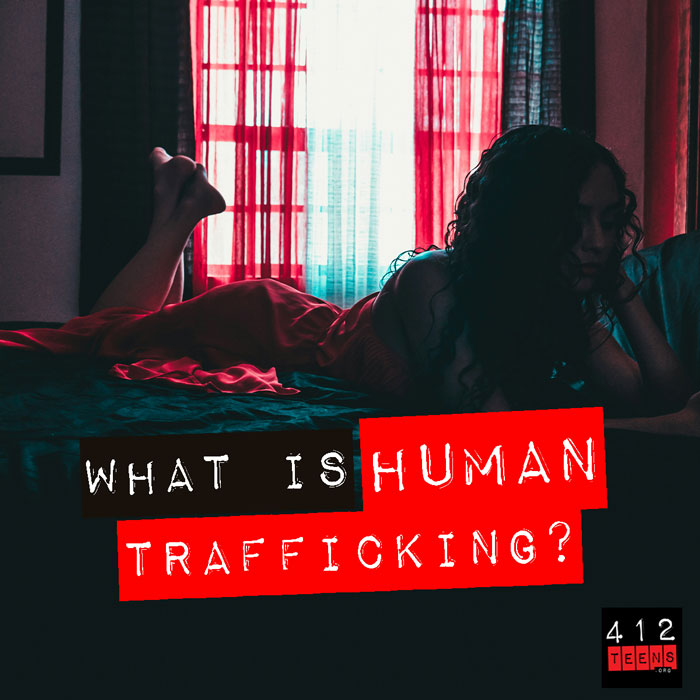What is human trafficking?

The United Nations provides this definition of human trafficking: "Human Trafficking is the recruitment, transportation, transfer, harboring or receipt of people through force, fraud or deception, with the aim of exploiting them for profit."
The most common types of trafficking are labor trafficking (working a job where someone else takes your paycheck), sex trafficking (providing sexual services against your will, for another person's profit), and forced marriage (such as arranged marriage that one or both spouses do not want).
If someone is being forced to provide sexual services and they are under the age of 18, "force, fraud, or deception" are not necessary for it to count as trafficking. Children are not considered able to provide truly aware consent.
Defining Human Trafficking
The words in that definition are complex. Let's break each of them down:
Recruitment refers to the process of a trafficker tricking a potential victim to gain control. This often involves false job offers, such as the promise of modeling work. This can happen in person or on social media.
Transportation is fairly self-explanatory. However, it's important to note that, although trafficking sometimes involves moving a person from one place to another, movement is not a requirement for it to be considered trafficking. Someone can be used for another person's profit while they are living at home.
Transfer means moving control of a person from one trafficker to another. This could look like agreeing to work at a restaurant, but once you get there, the recruiter leaves you with another person who tells you that you will be forced to provide sexual services to customers in the basement instead.
Harboring means keeping people in a place and not allowing them to leave. This often happens on farms, where laborers might be forced to sleep in sheds on the properties where they are working.
Receipt refers to being the one to take control of a person that someone else recruited. In our example with the restaurant above, the trafficker forcing a victim to provide sexual services in the basement would be guilty of receipt.
Force means that threat of physical or psychological harm is involved. Often, traffickers will threaten harm against a target's family members in order to make them do what they want.
Fraud means that there are deceptions happening, such as our examples of a false job offer.
Some definitions of human trafficking also list "coercion," which references a wide range of manipulation tactics that traffickers use to make a person do whatever they want. This could involve emotional, physical, or sexual abuse, blackmail, or withholding someone's vital documents like a passport or driver's license.
If some or all of those elements are happening, there is a good chance that the situation qualifies as human trafficking by law.
Is human trafficking considered modern-day slavery?
You might sometimes hear people calling human trafficking "modern-day slavery." That is a term used to talk about situations that are clearly slavery, but "modern" indicates that it might look a little different from the transatlantic slave trade that happened during the early years of the United States of America.
"Modern-day slavery" is a way to talk about human trafficking that conveys how serious it is. The difference between the two is that modern-day slavery is a more general description, and human trafficking is the correct legal term for the crime.
What does the Bible say about human trafficking?
Although the phrase "human trafficking" is never directly used in the Bible, the Bible has a lot to say about slavery—and it's clear that God has a fiercely protective heart for anyone who has experienced any kind of exploitation or bondage (Exodus 21:16).
The entire book of Exodus details God's commitment to bringing the people of Israel out of slavery in Egypt. In Exodus 5:1, Moses delivers a direct message from God about this enslaved nation of people: "Let my people go, that they may hold a feast to me in the wilderness."
That image of releasing God's people so that they can celebrate their freedom and closeness to Him is repeated over and over again in the Bible. We can see it again later in the Babylonian captivity, where the Israelites were yet again held hostage to another nation. Eventually, we read in Ezra 1 that God not only had the Babylonian ruler Cyrus release God's people, but he also required the Babylonians to pay restorative fees to those they had harmed.
In Ezra 1:4, we see that King Cyrus said, "In any locality where survivors may now be living, the people are to provide them with silver and gold, with goods and livestock, and with freewill offerings for the temple of God in Jerusalem."
Slavery & Freedom
The themes of slavery and freedom are so constant in Israel's culture that Jesus relied heavily on it when He was teaching about His gospel (good news) of love. Writing about the revolutionary message of Jesus and how it sets us free, the Apostle Paul said, "But thanks be to God that, though you used to be slaves to sin, you have come to obey from your heart the pattern of teaching that has now claimed your allegiance. You have been set free from sin and have become slaves to righteousness" (Romans 6:17-18).
How then do we respond biblically to slavery as it is present in our world today through human trafficking? It's clear that God's heart is for people to be free—not to exploit or "own" each other. Any social hierarchies directly contradict the ordering of the Kingdom of Heaven. This is clearly expressed in Galatians 3:28, which says, "There is neither Jew nor Gentile, neither slave nor free, nor is there male and female, for you are all one in Christ Jesus."
James 1:27 says, "Religion that is pure and undefiled before God the Father is this: to visit orphans and widows in their affliction, and to keep oneself unstained from the world."
Orphans and widows are vulnerable groups of people. Today, kids in foster care are the most vulnerable demographic to child sex trafficking in the United States. To care for these kids and other trafficking survivors, to advocate alongside them, is a pure way to love God.
How can I fight against human trafficking?
As a teenager, you are a frontline defense against human trafficking. Young people are some of the most vulnerable and at risk to trafficking, especially those who are in foster care, have mental health concerns, are part of a racial or sexual minority group, or live with disabilities. If you know anyone in one of those groups, making sure that they are befriended is a way of protecting them against potential trafficking.
If you notice any warning signs of trafficking in a classmate at school—things like frequent bruising, unexplained absences, sudden expensive gifts, or a much older girlfriend/boyfriend—talk to a trusted teacher or school counselor. Often, you will be able to see red flags that the adults around you can't.
You can also choose a nonprofit that fights human trafficking and hold a fundraiser or awareness walk. You can use Instagram or Facebook to fundraise right on your own social media profile. Some good nonprofits to select include International Justice Mission, Hope For Justice, A21, and The Exodus Road. You can also simply reshare posts from these organizations on social media to help amplify their mission.
Awareness walks in your community can be a great way to involve yourself in everyday activism. A21 has some great advice on how to get started, but you can walk in support of any anti-trafficking organization, using it as a chance to shed some light on the facts of human trafficking.
ALSO SEE:
- What are some signs of human trafficking?
- What does the Bible say about dealing with toxic / abusive people / relationships?
- Am I being sexually groomed?
- What is gaslighting?
- Should Christians use social media?
- What does the Bible say about keeping secrets?
- What is spiritual abuse?
- What are some signs of spiritual abuse?
- Why is it sinful for a church to cover up abuse?
- What does the Bible say about recovering from PTSD?


TL;DR
The United Nations defines human trafficking as "the recruitment, transportation, transfer, harboring or receipt of people through force, fraud or deception, with the aim of exploiting them for profit." Although the phrase "human trafficking" is never directly used in the Bible, the Bible has a lot to say about slavery — and it's clear that God has a fiercely protective heart for anyone who has experienced any kind of exploitation or bondage (Exodus 21:16). As a teenager, you are a frontline defense against human trafficking. Young people are some of the most vulnerable and at risk to trafficking, especially those who are in foster care, have mental health concerns, are part of a racial or sexual minority group, or live with disabilities. If you know anyone in one of those groups, making sure that they are befriended is a way of protecting them against potential trafficking.

Writer & Consulting Editor: Mary Nikkel
Mary is a music and nonprofit writer passionate about telling purposeful stories about music, meaning, and mental health. She currently serves as Senior Content Manager for anti-human trafficking nonprofit The Exodus Road as well as providing PR services to bands and start-up nonprofits.
